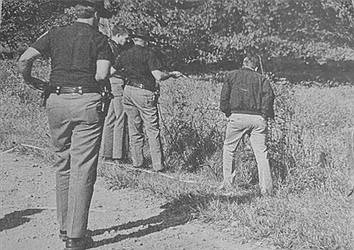APC recommends new stormwater specs
March 15, 2023 at 5:54 p.m.
Franklin County Area Plan Commission met March 8 with Kaitlin Sterwerf attending her first public meeting since being named new planning director. Board president Robert Braun commended her on “doing a wonderful job”so far.
An early agenda item was the new county stormwater specifications that a committee - headed by APC member/county surveyor Rob Seig and board member Daryl Kramer - recently worked on to amend current language.
The roughly 113-page document contains design parameters for residential development (subdivisions), industrial and commercial sites and other conditional uses. Kramer noted a primary change was replacing the words “Franklin County surveyor”at points in the text with “Franklin County stormwater control policy.”Seig added the current county zoning code was also proposed for amendment, so it would “point to”this new policy if adopted as an ordinance.
To demonstrate the need for updated standards, Seig brought up a PowerPoint presentation looking at the March 3 rain event in the county.
A station on the Whitewater River indicated about 2.5 inches of rainfall, basically a two-year event for a 24-hour period. He also displayed photos taken of standing water near Reservoir Road –specifically in areas that are targeted for new residential development. (On March 2, Brookville Town Council gave its support of a sewer line extension going up Reservoir Hill as part of a Regional Economic and Acceleration Development Initiative project to potentially initiate additional housing.)
“Without a policy like this, you put (approximately) 200 homes up there, you’e going to amplify the situation and make it a lot worse,”said Seig. “It helps control additional runoff from new development. For instance, a person who lives down the road from the golf course …before water reaches their property, this could help not compound the issue and save that person money.”
Marty Hacker, resident in the proposed target area, gave an example of a neighbor who’s been in her house for 45 years and had never experienced basement problems. He said recently someone built a home behind her house; since then, she’s had a flooded basement three times and paid $15,000 to redo her finished basement.
Hacker pleaded that the board do its best to make sure development was done right.
Braun thanked him for his comments and said these were the situations the board hopes to avoid as result of the new specs.
Seig spoke to Hacker’s example, saying disputes between one or two homes would likely be a civil issue.
“‘Water’s a common enemy, but a person who blocks water could be subject to a civil penalty,”he said. “There may be a request to a commissioner or drainage board to address the situation. A drainage board, through Indiana Code, can take action if someone’s created a blockage.”
Seig pointed out that specifications would help with checks and balances on new construction.
Kramer emphasized that the specs do not pertain to agriculture –ag controlled by drainage board –or single-family homes provided there are fewer than five lots in one area; five or more drawing off the same infrastructure constitutes a subdivision.
He added there’s still the possibility of a 100-year rain event completely overwhelming the system.
“This is a minimum standard to make an even playing field for everybody who does this kind of work,”said Kramer.
Seig moved to send a favorable recommendation to commissioners for adoption of the specifications; motion passed.
A lengthy discussion on the former Michaela Farms property in Oldenburg took place later in the meeting. Greenacres Foundation purchased the farm in 2021 to establish an agricultural education facility. Issue at hand was a 5-year plan originally approved for Michaela and since extended by one year to Greenacres; another item involved property parcels –north of State Road 229 and south of St. Mary’s Road (40 acres) – not owned by either the Sisters of Saint Francis or Greenacres that need reverted to original zoning. The bulk of the land is currently approved UD (unit development), carried over from Michaela.
Alex Saurber, property director for Greenacres, told the board the entire property will be used for ag education with animals throughout the acreage.
Kramer said APC needed to know in advance if there was to be anything else beyond agriculture.
“We’re basically keeping the farm as is, just building the ed facility and offices for onsite staff,”Saurber answered. “On the 229 side, we have our farm store.”
“That’s the area we need to focus on for UD moving forward,”said Seig.
Terry Duffy, who serves on the Board of Zoning Appeals, was asked for input.
“Code requires an original development plan that’s expired or abandoned to be reverted back to original zoning,”he said. “If Greenacres weren’t here asking for new use, rather than develop descriptions for all pieces not included in the new footprint, simply follow code and (revert) it all back. Once that’s done, Greenacres can come in and ask for new UD or whatever.”
Duffy foresaw no stumbling block in that process. Seig said the beauty of UD is it allows for mixed use within a parcel.
APC attorney Tammy Davis noted the board granted an extension rather than doing the zone reversion. The idea was to let Greenacres move ahead as planned.
“Is the board saying they’ll grant an extension on the original application for the (Greenacres) footprint, then figure out how to rezone what is not Greenacres’’”Duffy asked.
Kramer responded yes.
Seig suggested Greenacres request an amended zoning application for any area they intend to develop as UD. A preliminary plan would precede development, followed by a finalized plan to be completed within five years. Greenacres was given about three more months to clarify their intentions.
Davis also said code requires that owners have 24 months to show progress or land reverts to original zoning.
As for the parcels not in Greenacres’name, Seig proposed Sterwerf contact those property owners before any action is taken by the board.
A technical review committee was also discussed. Davis had researched other counties and municipalities within Indiana to study the makeup of what would be strictly an advisory group.
Seig recommended a sitting county commissioner sit on the committee; commissioner Gerald Wendel was present and said he’d be willing to do this. Seig said this group would work to protect county code, assisting applicants with plans so APC meetings aren’t bogged down by drawn-out conversations.
Davis advised the board has total discretion as to who sits on the committee. This could be reps from the health board, utilities, engineers, soil and water, Army Corps or DNR. There were two options and the board approved modifying the second option to suit its needs.
In other news
Braun wished to close public comment to Zoom attendees during meetings in interest of smoother proceedings. Residents should attend meetings if they wish to speak. This passed as a motion.
Updated code for cell towers and signage was brought up. Seig had Sterwerf look at Ripley and Union counties’code regarding cell/ communication towers; a primary concern was safety, having fall zones that required people to be in structures far enough away from the tower. Kramer said there’s a need to update zoning code for signs. Someone in the county was wanting to place a large billboard sign on his property, which could create issues.
Member Christine Rains said the board should consider zoning for barndominiums, one of the fastest-growing alternative home trends that involves building on to existing barns for a living space. A resident had approached her about the building process. Member Todd Raible went into some construction details and at what point engineering was required. A solid foundation seems to be the most important piece for these “barndos.”
Zoning for the future Spires Senior Village on Oldenburg Academy land –developed by Merchants Affordable Housing, Inc. utilizing the vacant Olivia and Theresa halls - was discussed. One issue APC has is drainage from the parking lot. In a letter to the board, the developers were essentially asking for no subsequent requirements on discretionary actions like conditional use and design review. Seig felt this gave them “free reign”and asked the board to strike that from the letter; this was approved.
Latest News
E-Editions
Events
Franklin County Area Plan Commission met March 8 with Kaitlin Sterwerf attending her first public meeting since being named new planning director. Board president Robert Braun commended her on “doing a wonderful job”so far.
An early agenda item was the new county stormwater specifications that a committee - headed by APC member/county surveyor Rob Seig and board member Daryl Kramer - recently worked on to amend current language.
The roughly 113-page document contains design parameters for residential development (subdivisions), industrial and commercial sites and other conditional uses. Kramer noted a primary change was replacing the words “Franklin County surveyor”at points in the text with “Franklin County stormwater control policy.”Seig added the current county zoning code was also proposed for amendment, so it would “point to”this new policy if adopted as an ordinance.
To demonstrate the need for updated standards, Seig brought up a PowerPoint presentation looking at the March 3 rain event in the county.
A station on the Whitewater River indicated about 2.5 inches of rainfall, basically a two-year event for a 24-hour period. He also displayed photos taken of standing water near Reservoir Road –specifically in areas that are targeted for new residential development. (On March 2, Brookville Town Council gave its support of a sewer line extension going up Reservoir Hill as part of a Regional Economic and Acceleration Development Initiative project to potentially initiate additional housing.)
“Without a policy like this, you put (approximately) 200 homes up there, you’e going to amplify the situation and make it a lot worse,”said Seig. “It helps control additional runoff from new development. For instance, a person who lives down the road from the golf course …before water reaches their property, this could help not compound the issue and save that person money.”
Marty Hacker, resident in the proposed target area, gave an example of a neighbor who’s been in her house for 45 years and had never experienced basement problems. He said recently someone built a home behind her house; since then, she’s had a flooded basement three times and paid $15,000 to redo her finished basement.
Hacker pleaded that the board do its best to make sure development was done right.
Braun thanked him for his comments and said these were the situations the board hopes to avoid as result of the new specs.
Seig spoke to Hacker’s example, saying disputes between one or two homes would likely be a civil issue.
“‘Water’s a common enemy, but a person who blocks water could be subject to a civil penalty,”he said. “There may be a request to a commissioner or drainage board to address the situation. A drainage board, through Indiana Code, can take action if someone’s created a blockage.”
Seig pointed out that specifications would help with checks and balances on new construction.
Kramer emphasized that the specs do not pertain to agriculture –ag controlled by drainage board –or single-family homes provided there are fewer than five lots in one area; five or more drawing off the same infrastructure constitutes a subdivision.
He added there’s still the possibility of a 100-year rain event completely overwhelming the system.
“This is a minimum standard to make an even playing field for everybody who does this kind of work,”said Kramer.
Seig moved to send a favorable recommendation to commissioners for adoption of the specifications; motion passed.
A lengthy discussion on the former Michaela Farms property in Oldenburg took place later in the meeting. Greenacres Foundation purchased the farm in 2021 to establish an agricultural education facility. Issue at hand was a 5-year plan originally approved for Michaela and since extended by one year to Greenacres; another item involved property parcels –north of State Road 229 and south of St. Mary’s Road (40 acres) – not owned by either the Sisters of Saint Francis or Greenacres that need reverted to original zoning. The bulk of the land is currently approved UD (unit development), carried over from Michaela.
Alex Saurber, property director for Greenacres, told the board the entire property will be used for ag education with animals throughout the acreage.
Kramer said APC needed to know in advance if there was to be anything else beyond agriculture.
“We’re basically keeping the farm as is, just building the ed facility and offices for onsite staff,”Saurber answered. “On the 229 side, we have our farm store.”
“That’s the area we need to focus on for UD moving forward,”said Seig.
Terry Duffy, who serves on the Board of Zoning Appeals, was asked for input.
“Code requires an original development plan that’s expired or abandoned to be reverted back to original zoning,”he said. “If Greenacres weren’t here asking for new use, rather than develop descriptions for all pieces not included in the new footprint, simply follow code and (revert) it all back. Once that’s done, Greenacres can come in and ask for new UD or whatever.”
Duffy foresaw no stumbling block in that process. Seig said the beauty of UD is it allows for mixed use within a parcel.
APC attorney Tammy Davis noted the board granted an extension rather than doing the zone reversion. The idea was to let Greenacres move ahead as planned.
“Is the board saying they’ll grant an extension on the original application for the (Greenacres) footprint, then figure out how to rezone what is not Greenacres’’”Duffy asked.
Kramer responded yes.
Seig suggested Greenacres request an amended zoning application for any area they intend to develop as UD. A preliminary plan would precede development, followed by a finalized plan to be completed within five years. Greenacres was given about three more months to clarify their intentions.
Davis also said code requires that owners have 24 months to show progress or land reverts to original zoning.
As for the parcels not in Greenacres’name, Seig proposed Sterwerf contact those property owners before any action is taken by the board.
A technical review committee was also discussed. Davis had researched other counties and municipalities within Indiana to study the makeup of what would be strictly an advisory group.
Seig recommended a sitting county commissioner sit on the committee; commissioner Gerald Wendel was present and said he’d be willing to do this. Seig said this group would work to protect county code, assisting applicants with plans so APC meetings aren’t bogged down by drawn-out conversations.
Davis advised the board has total discretion as to who sits on the committee. This could be reps from the health board, utilities, engineers, soil and water, Army Corps or DNR. There were two options and the board approved modifying the second option to suit its needs.
In other news
Braun wished to close public comment to Zoom attendees during meetings in interest of smoother proceedings. Residents should attend meetings if they wish to speak. This passed as a motion.
Updated code for cell towers and signage was brought up. Seig had Sterwerf look at Ripley and Union counties’code regarding cell/ communication towers; a primary concern was safety, having fall zones that required people to be in structures far enough away from the tower. Kramer said there’s a need to update zoning code for signs. Someone in the county was wanting to place a large billboard sign on his property, which could create issues.
Member Christine Rains said the board should consider zoning for barndominiums, one of the fastest-growing alternative home trends that involves building on to existing barns for a living space. A resident had approached her about the building process. Member Todd Raible went into some construction details and at what point engineering was required. A solid foundation seems to be the most important piece for these “barndos.”
Zoning for the future Spires Senior Village on Oldenburg Academy land –developed by Merchants Affordable Housing, Inc. utilizing the vacant Olivia and Theresa halls - was discussed. One issue APC has is drainage from the parking lot. In a letter to the board, the developers were essentially asking for no subsequent requirements on discretionary actions like conditional use and design review. Seig felt this gave them “free reign”and asked the board to strike that from the letter; this was approved.





